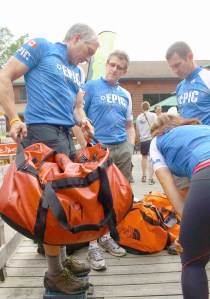THE FORKS — Nearly 200 adventure racers from around the world will embark Wednesday on a four-day race through the wilds of northern Maine.
They’re just not sure where they’re headed, exactly.
At 10 a.m. Wednesday, 45 teams — including two from Maine — will start the Untamed New England Adventure Race, a nonstop trek that will feature whitewater paddling, mountain biking and trekking, among other things. The event, which will last through Sunday, is a qualifier for the Adventure Racing World Championship in the French Alps in September.
Until late Tuesday evening, the racers had no idea where the course would take them. They knew they would start somewhere north of The Forks, and they knew the race would end somewhere else roughly four days later.
On Tuesday afternoon, the Northern Outdoors Resort was teeming with lean, spandex-clad adventure racers nervously preparing for the event. Some groups, like the world-champion Thule Adventure Team, hailed from as far away as Sweden. Two Maine teams were on hand to sign liability releases and pick up their emergency GPS transponders, including Team AR A Decade Later of Bethel and Team Average Joes of Augusta.
Most athletes, like Kelly Boyd of Team Epic Endurance, spent Tuesday afternoon carefully weighing their supply bags. Each team member is allowed one 35-pound bag, which will be transported to checkpoints along the course. Weighing his bag on a small electronic scale, Boyd — a native of Grande Prairie, Alberta, Canada — said he was looking forward to Tuesday’s 7 p.m. race meeting, when he would finally see the course.
“I’m anxious to get the maps,” he said. “I have no idea until tonight when they give us the maps. Then we get to look at where all the checkpoints are and plan our strategy for our race, and plan the route we’re going to take.”
For Boyd and his fellow racers, strategy is everything. Unlike most endurance athletes, adventure racers compete nonstop for days, and must ration their energy and food accordingly. While racers want to get from point A to point B as fast as possible, they also realize that over the course of four days, they’ll have to eat and sleep to keep going. That requires planning.
Planning is also important for the race organizers. Jill Peloquin, the race’s logistics coordinator, spent hundreds of hours preparing for the event. Most races, with their multiple sporting disciplines and remote backcountry venues, require 10 times as much time to plan as they do to run, Peloquin said.
“If it’s a 10-hour race, you need 100 hours of on-course time for planning,” Peloquin said. “You can do the math. It’s an unbelievable amount of time.”
Peloquin and other volunteers who will staff the course through Sunday will work just as hard as any of the racers. Since the race goes nonstop for four days, important checkpoints will be staffed around the clock.
“In an adventure race, you never know how long it’s going to take a team to go from A to B,” Peloquin said. “They could get lost; they may want to sleep. There’s all sorts of iterations that go on during a race.”
By 7 p.m. Tuesday, the racers had a better sense of what they were getting themselves into. Race organizer Grant Killian unveiled a course that includes rafting down the Kennebec River, a paddle across Flagstaff Lake, grueling climbs up Sugarloaf and other mountains, orienteering courses, and miles and miles of mountain biking.
With a defined course now in their minds, the racers set about planning their routes and rearranging the contents of their packs. With less than 12 hours until the start of the longest race of their lives, the athletes scrutinized every ounce they would carry for the next four days.
“I find it a bit confusing, just the organizational aspect of it, because you’re constantly having to think — just in terms of packing — about what you have,” said Stefani Jackenthal, a New York City native competing for Team Discov-AR.
“My biggest fear is, ‘What if I forget to pack something?’” she said.

Comments are no longer available on this story